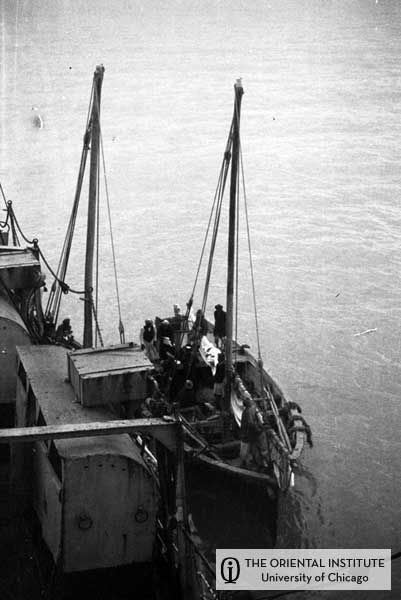Sunday Morning
March 7, 1920
This morning we are far on our way up the Persian Gulf. The coast of Persia is again visible on the north as I look out of my port hole. The same desolate cliffs, seemingly of limestone, drop abruptly to the sea, much as they drop from the Sahara plateau to the floor of the Nile valley. But the rocks lack the rich and luminous color which makes the Nile cliffs so beautiful. The captain is heading for Bushire on the north shore of the Persian Gulf, where he is instructed to drop some mail bags, though we shall not stop. Bushire is not included in your Philips’ map.
 Persian Gulf: Unloading the mail from the SS “Torilla” into a little sail-boat. Persian Gulf, some miles from Bushire. March 8, 1920. (N. 44580, P. 65814)
Persian Gulf: Unloading the mail from the SS “Torilla” into a little sail-boat. Persian Gulf, some miles from Bushire. March 8, 1920. (N. 44580, P. 65814)
We are very much encouraged by information which we have been able to gather from the British officers on board. One of them who was in Mosul on February 12 is quite confident that that we shall be able to reach Mosul and see Nineveh. This will enable us to visit the leading ruins of both Babylonia and Assyria, whereas if we are unable to reach Mosul we shall see little more than Babylonia. Our survey of Babylonia also, is to be much easier than we expected. One of the officers informs us that the railway from Bosra to Baghdad (see Philips’ map) has been shifted from the Tigris to the Euphrates. Our line of march from Bosra to Baghdad therefore, will never be very far from the railway. This line was only finished two months ago, and a regular train service is hardly a month old. We are therefore getting the earliest possible advantage of the transportation facilities.
We have found on board a young officer going out to begin duty as third or fourth officer in the mercantile marine on an oil steamer. If you will look at the eastern edge of the Philips map, you will see marked the oil fields and a pipe line of the Anglo-Persian Oil Company leading down from the Persian mountains to the river at Abadan, just below Muhammera, where the company has its offices, the docks and loading arrangements being at Abadan. I had learned at Cairo of the arrival of a traveler who had come to Egypt, around Arabia directly, without making the long and expensive detour to Bombay. I had spent some time in Bombay looking this matter up, and had ascertained that the place to go in order to arrange it was Muhammera. Luckily we now find a young man among our fellow passengers who knows all about it, and is employed by the company with which we shall deal. He is quite ready to aid us all he can. The oil steamers do not endeavor to get passengers; but they have a couple of extra rooms which are quite comfortable, they set a good table maintained by oriental servants, and the entire deck and bridge would be at our disposal. Besides saving probably a fortnight’s time, many days on a scorching tropical ocean and much expense, the use of one of these steamers would carry us around the entire coast-line of Arabia and give us a view of it at close range. For this trip alone I would be glad to go even on an uncomfortable ship, and it will give us a glimpse of South Arabia to compensate for the loss of our caravan trip through North Arabia and Syria, which I had at first planned. One of our first jobs in Bosra therefore will be to take a launch down the river to Muhammera with this young officer, and endeavor to make definite arrangements for five berths on an oil steamer leaving about the last week in May for Egypt. It should not take us more than 10 or 11 days, as against three weeks on this trip out; and if we had to wait a week in Bombay as is often the case, the saving would be over a fortnight. This will greatly aid us to finish up in Syria on time.
For the full story of my exciting trip you should come to the special exhibit “Pioneers to the Past: American Archaeologists in the Middle East, 1919-1920,” at the Oriental Institute!
1155 East 58th Street Chicago, IL 60637
Hours:
- Tuesday 10:00 am to 6:00 pm
- Wednesday 10:00 am to 8:30 pm
- Thursday 10:00 am to 6:00 pm
- Friday 10:00 am to 6:00 pm
- Saturday 10:00 am to 6:00 pm
- Sunday noon to 6:00 pm
- Closed Mondays
http://oi.uchicago.edu/museum/special/pioneer/
And visit me on facebook at: http://www.facebook.com/profile.php?id=3318774#/profile.php?v=info&ref=profile&id=100000555713577